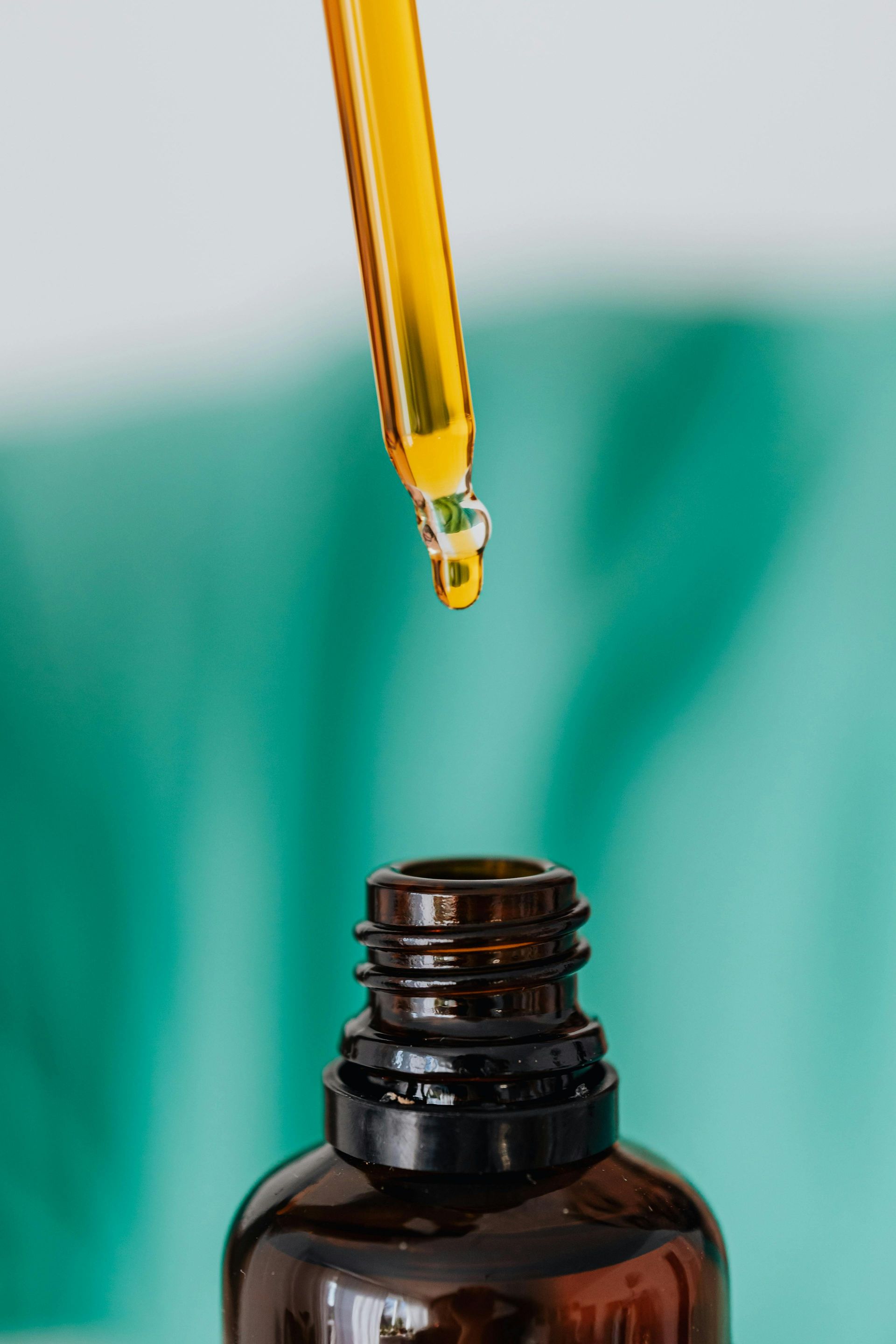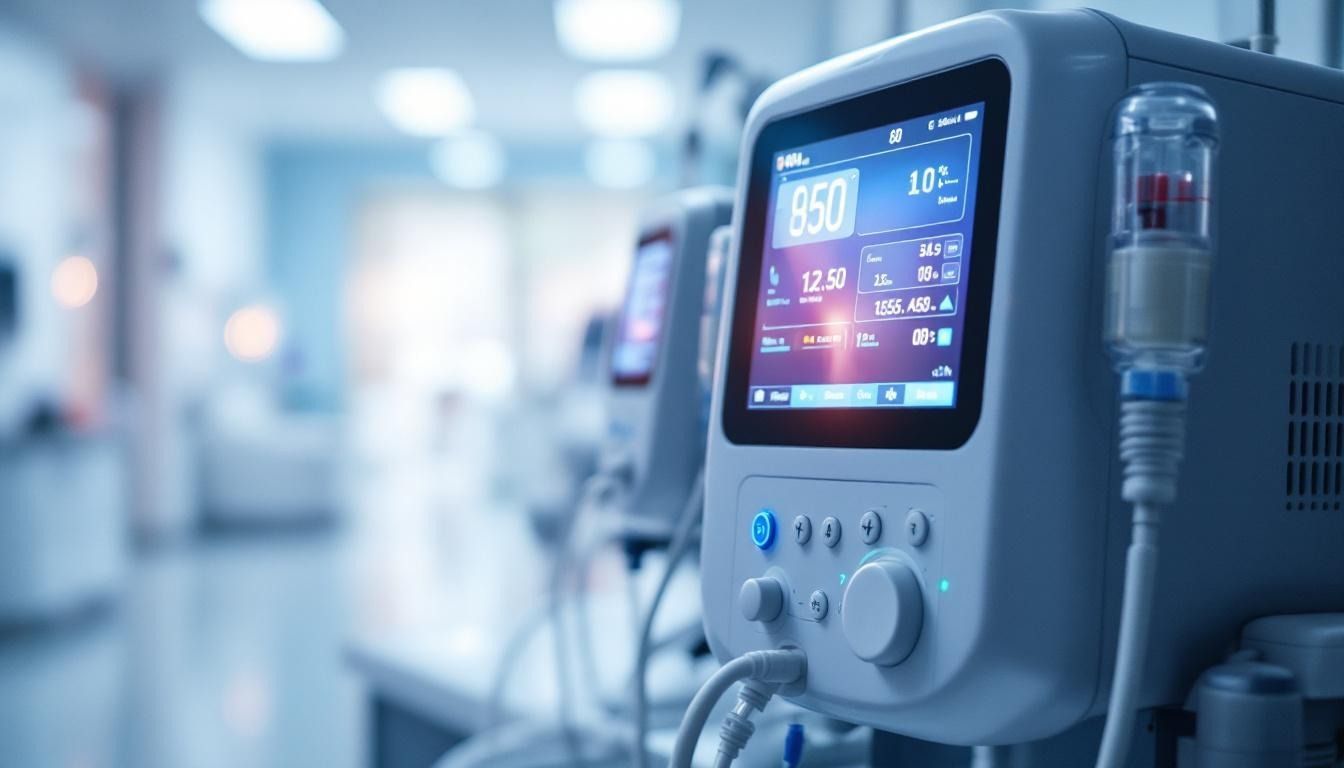The Role of TPN in Managing Nutritional Deficiencies
Introduction to TPN
Total Parenteral Nutrition (TPN) has emerged as a critical intervention for patients who are unable to meet their nutritional needs through traditional eating or enteral methods. This article explores how TPN serves as an essential tool in managing nutritional deficiencies, especially for individuals with compromised gastrointestinal function or severe malnutrition. By bypassing the digestive system, TPN delivers a well-balanced mixture of nutrients directly into the bloodstream, offering life-sustaining support that prevents malnutrition and related complications.
Composition and Nutritional Benefits of TPN
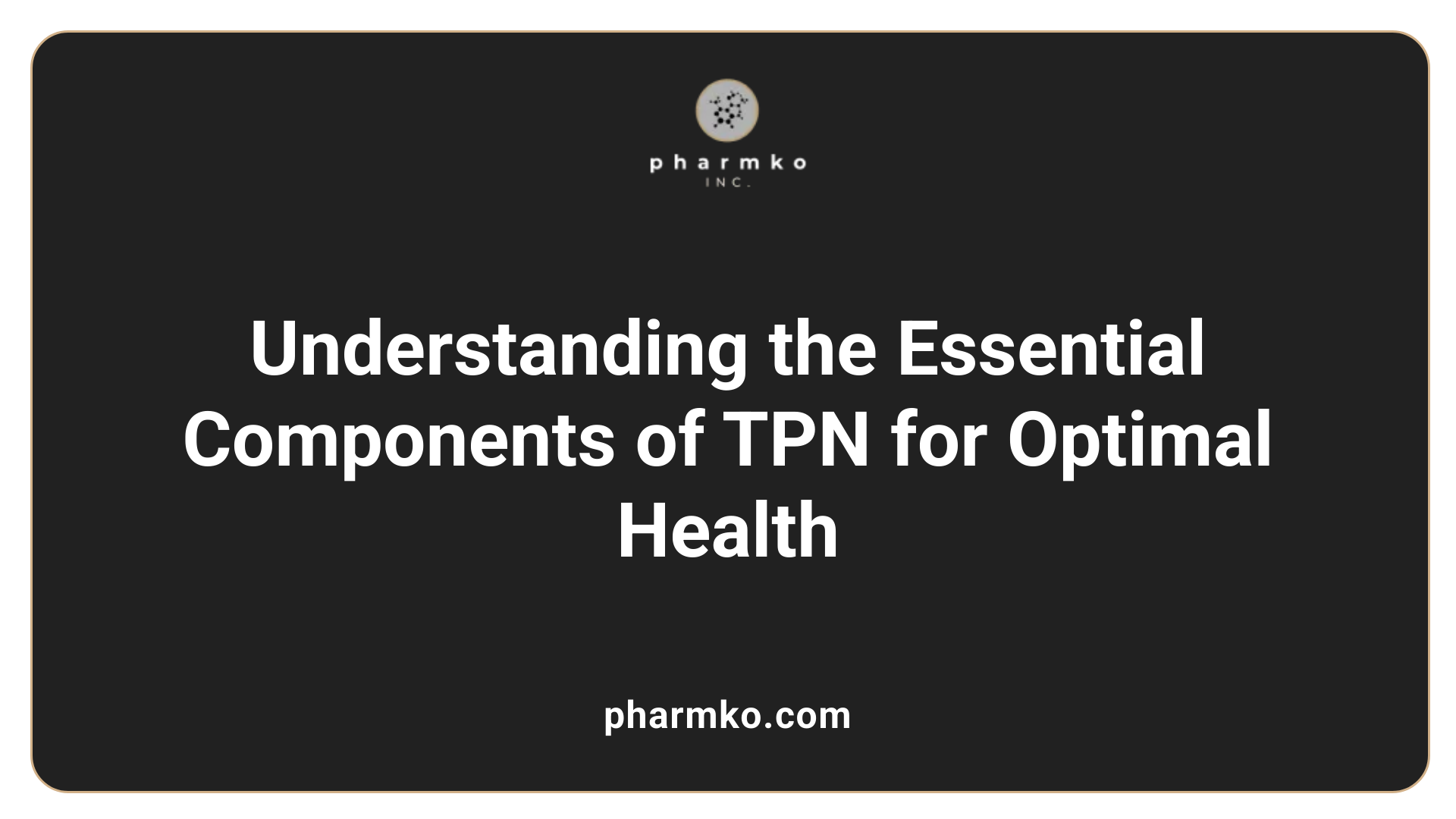
What does TPN provide nutritionally?
Total Parenteral Nutrition (TPN) provides a comprehensive solution for patients with impaired gastrointestinal function. The TPN solution is specifically designed to meet individual nutritional requirements and typically includes:
- Proteins (Amino Acids): Essential for muscle maintenance and body repair.
- Carbohydrates (Dextrose): The primary energy source to fuel metabolic processes.
- Fats (Lipid Emulsions): Necessary for energy, absorption of fat-soluble vitamins, and overall cellular function.
- Electrolytes : Important for maintaining fluid balance and nerve function.
- Vitamins and Minerals : Crucial for various metabolic functions and overall health.
- Water : To ensure hydration, an essential component in nutrient transport. While the composition may vary based on clinical needs, some patients may also receive additional intravenous fat.
What are the benefits of TPN nutrition?
The benefits of Total Parenteral Nutrition are profound, particularly for individuals unable to utilize their digestive system. Key advantages include:
- Prevention of Malnutrition : TPN delivers essential nutrients directly into the bloodstream, keeping the body nourished and preventing nutrient deficiencies that can lead to complications.
- Tailored Nutritional Support : Each TPN regimen is customized to address specific dietary needs, ensuring a balanced intake of proteins, carbohydrates, fats, vitamins, and minerals that align with the patient’s health condition.
- Flexibility in Administration : TPN can be administered in various ways, including at home, which enhances patient mobility and improves quality of life.
- Reduced Risk of Complications : By providing complete nutrition, TPN helps mitigate risks associated with severe gastrointestinal diseases. However, it requires ongoing monitoring to manage potential side effects, such as metabolic disturbances and infections.
In summary, TPN is a lifeline for individuals with severe gastrointestinal compromises, delivering critical nutrients while supporting overall health and recovery.
Role and Purpose of TPN
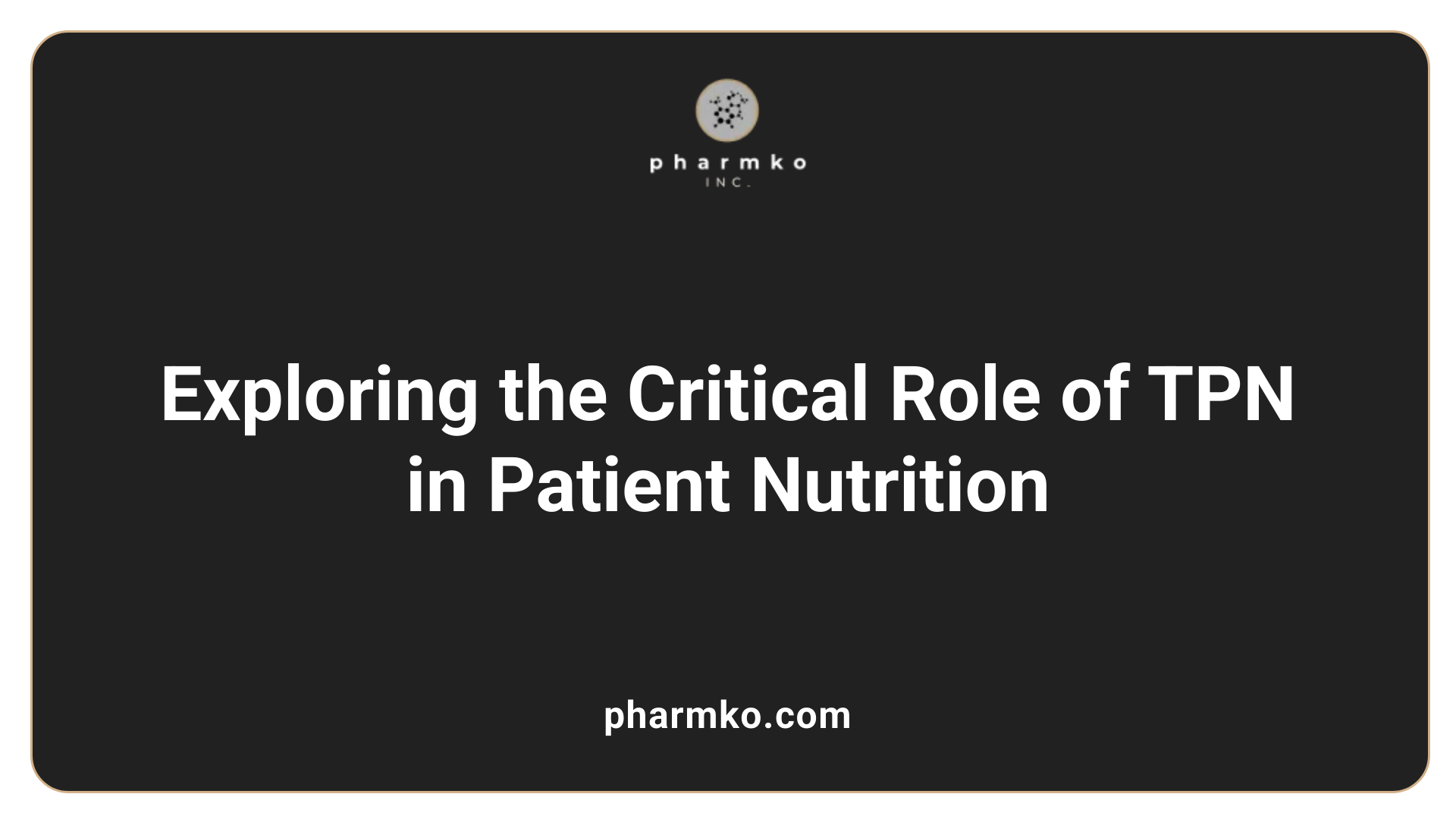
What is the role and primary purpose of TPN?
Total Parenteral Nutrition (TPN) plays a vital role in providing essential nutrients and caloric intake for patients unable to obtain sufficient nutrition through their gastrointestinal (GI) tract. By delivering nutrients intravenously, TPN circumvents the digestive system and is crucial for individuals facing malnourishment, particularly in the context of severe gastrointestinal conditions like Inflammatory Bowel Disease (IBD), including Crohn's Disease (CD) and Ulcerative Colitis (UC).
TPN is specifically designed for patients who cannot consume food orally or through enteral feeding. This includes those with bowel obstructions, GI fistulas, significant surgical resection, or severe malabsorption syndromes. For these individuals, TPN not only helps restore nutritional status but can also lead to improvements in bowel function and reduced inflammation, supporting overall recovery.
Applications in malnutrition and gastrointestinal conditions
Despite its benefits, TPN's use has seen a decline in recent years. This change reflects a shift in management strategies for malnourished patients, especially among those with IBD. While TPN is effective for boosting nutrition, healthcare professionals now often integrate it with other therapies, emphasizing the importance of a tailored approach.
In summary, while TPN is crucial in circumstances where oral or enteral nutrition is inadequate, its application within the treatment continuum is carefully balanced with ongoing medications and therapies for conditions like CD, ensuring patients receive the most comprehensive care.
Types and Customization of TPN Solutions

What are the types of TPN solutions?
The types of Total Parenteral Nutrition (TPN) solutions can be primarily categorized based on their composition and delivery method. There are two main types:
- 3-in-1 solution : This combines dextrose, amino acids, and lipid emulsions into a single admixture, allowing all components to be infused simultaneously.
- 2-in-1 solution : This contains dextrose and amino acids while lipid emulsions are administered separately, which can help to manage patients' lipid intake more precisely.
Additionally, TPN can be classified by the route of administration:
- Central Parenteral Nutrition (CPN) : Delivered through a central vein, it is ideal for long-term nutritional support and is suitable for patients needing higher nutrient concentrations.
- Peripheral Parenteral Nutrition (PPN) : Administered through peripheral veins, this method is typically used for short-term nutritional needs and is less concentrated.
These solutions are customized to meet the dietary requirements of patients based on their clinical conditions, ensuring that they receive full nutritional support vital for recovery and maintenance of their health.
Administration methods of TPN
The administration of TPN requires careful consideration of both the type of solution and the patient's specific needs. CPN is often used when patients need extensive nutritional support over extended periods, managing complex medical conditions like intestinal failure or those recovering from major surgeries. On the other hand, PPN is best for shorter durations, often used when a patient's condition is expected to improve, enabling a return to enteral nutrition.
This tailored approach to TPN ensures that patients receive the most appropriate nutritional support, addressing their unique medical circumstances and promoting overall healing.
Guidelines for TPN Administration
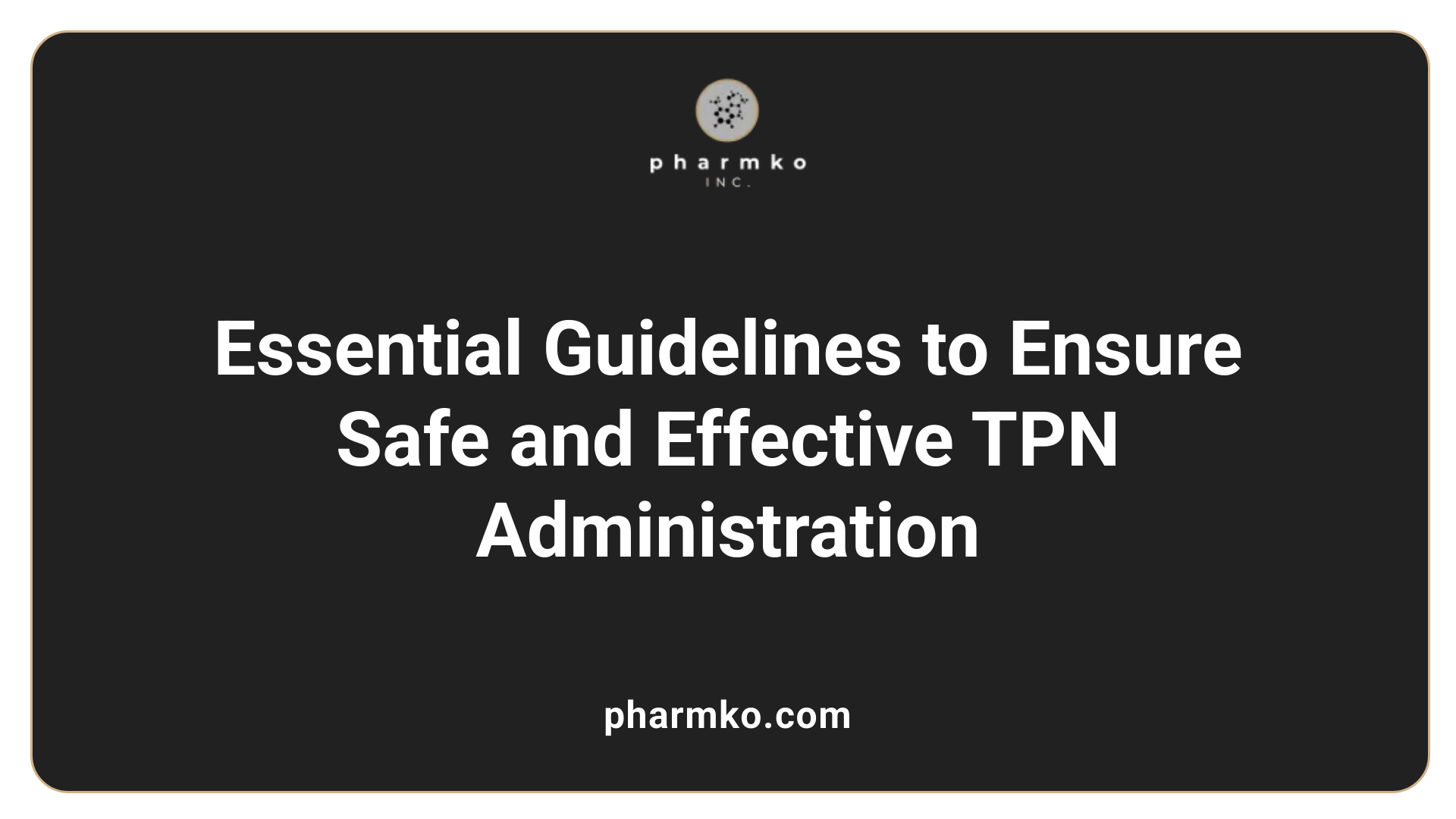
What are the guidelines for TPN administration?
The guidelines for TPN (Total Parenteral Nutrition) administration are critical for ensuring patient safety and minimizing complications. Key protocols include:
- Aseptic Techniques: Strict aseptic techniques must be followed to minimize infection risks at the intravenous access site.
- Hand Hygiene: Healthcare providers are required to perform thorough hand hygiene before handling TPN solutions or any associated equipment.
- Inspection of TPN Bags: Prior to use, TPN bags should be inspected for any signs of contamination, discoloration, or leakage.
- Matching Orders: Confirm that the TPN solution matches the physician’s order, including the correct composition and patient-specific details.
- Temperature Adjustments: TPN solutions should be brought to room temperature before administration to enhance tolerance.
- Medication Addition: If medications are to be added to the TPN, proper protocols must be followed to avoid contamination.
Continuous monitoring of the patient's condition is paramount. Regular assessments of liver function and serum electrolytes help identify potential metabolic imbalances. Additionally, a central venous catheter is required for delivering TPN, and it is important to gradually taper the TPN infusion when discontinuing to avoid hypoglycemia.
Monitoring and management of TPN therapy
Ongoing monitoring involves regular blood tests and clinical evaluations. Parameters such as electrolytes, glucose, and liver enzymes should be monitored frequently to provide timely interventions for any abnormalities. Patient symptoms should be routinely assessed to adapt therapy as needed, ensuring optimal nutritional support while minimizing risks.
Complications and Management in TPN
What are the common complications of TPN and how can they be managed?
Total Parenteral Nutrition (TPN) is often a lifeline for patients with compromised gastrointestinal function, but it carries potential complications that healthcare providers must vigilantly manage.
-
Refeeding Syndrome : This serious condition can arise when initiating TPN in severely malnourished patients. It causes severe electrolyte imbalances, particularly affecting phosphorus, magnesium, and potassium levels. Close monitoring during the first few days of TPN is critical to prevent this condition.
-
Hyperglycemia : Affecting nearly 50% of TPN patients, elevated blood sugar can lead to morbidity and a prolonged hospital stay. Regular monitoring of blood glucose and appropriate insulin administration are crucial strategies to manage hyperglycemia effectively.
-
Hepatic Complications : Long-term TPN can result in liver conditions like fatty liver and cholestasis due to excess calories and nutrient imbalances. Monitoring liver function tests is essential to detect and manage these issues early.
-
Infectious Complications : Infections linked to catheter use can have severe consequences. Proper catheter care, including sterile techniques during insertion and maintenance, is vital to prevent infections.
-
Metabolic Bone Disease : Conditions such as osteoporosis may develop due to inadequate calcium and vitamin D intake and lack of physical activity. Regular assessments of bone health, dietary adjustments, and supplementation are recommended to manage these risks.
The management of TPN complications involves a multidisciplinary approach, engaging nutritionists, pharmacists, and nursing staff to ensure patient safety and nutritional adequacy. Regular monitoring of nutritional status and laboratory values helps adjust TPN formulations and dosage according to individual needs.
Impact of TPN on Life Expectancy
How does TPN influence life expectancy in patients?
Total parenteral nutrition (TPN) can notably impact life expectancy for individuals relying on it for essential nutritional support. In patients who are TPN-dependent, studies reveal a survival rate ranging from 65% to 80% over a three-year timeline. Specifically, these studies provide survival probabilities of 88% at one year, 74% at three years, and 64% at five years.
TPN serves as a lifesaving measure, especially for patients with malignancies or severe malnutrition due to gastrointestinal dysfunction. However, it's important to note that many patients do not see significant quality of life improvements. Mortality often stems from the underlying health conditions rather than complications directly related to TPN. This underscores the need for precise assessments before initiating TPN therapies.
What factors affect TPN outcomes?
Multiple factors can influence the effectiveness of TPN on life expectancy:
- Age : Older patients may have poorer survival rates.
- Body Mass Index (BMI) : Lower BMI can correlate with less favorable outcomes.
- Underlying Health Conditions : The presence of severe diseases can limit the benefits of TPN.
- Nutritional Status : Patients' initial nutritional status can affect their ability to respond positively to TPN.
- Careful Monitoring : Regular assessments and adjustments to the TPN regimen are essential to optimize patient outcomes.
In conclusion, while TPN has the potential to extend life in certain patients, comprehensive clinical evaluation is crucial, especially for those in fragile health for whom the intervention might not yield benefits.
Clinical Applications of TPN in Various Conditions
TPN for Specific Medical Conditions
Total Parenteral Nutrition (TPN) is crucial for patients with various medical conditions that impair their ability to absorb nutrients via the gastrointestinal (GI) tract. Conditions such as short bowel syndrome , inflammatory bowel diseases , and intestinal obstructions necessitate the use of TPN to provide complete nutrition. Here’s how TPN plays a significant role:
- Bowel Obstruction : When the bowel cannot effectively process food, TPN delivers essential nutrients directly into the bloodstream, bypassing the obstructed area.
- Abdominal Surgery : Post-operative patients may not be able to tolerate oral intake; TPN supports their healing process.
- Severe Malnutrition : Critically ill patients often require TPN for nutritional support during hospitalization to prevent complications related to malnutrition.
Role in Critical Care and Rehabilitation
In critical care settings, TPN is a life-saving intervention. For instance, patients with COVID-19-related malnutrition cannot consume adequate nutrition due to respiratory support or other critical needs. TPN ensures they receive necessary nutrients directly.
Moreover, TPN is vital in rehabilitation, especially for preterm neonates in NICU settings where nutrient intake is challenging. It supports growth and development through a tailored mixture of macronutrients and micronutrients, ensuring these vulnerable patients thrive.
Table: Clinical Applications of TPN
| Medical Condition | Role of TPN | Patient Benefit |
|---|---|---|
| Short Bowel Syndrome | Provides nutrients when GI absorption is inadequate | Prevents malnutrition |
| Inflammatory Bowel Diseases | Supplies total nutrition during flare-ups | Aids in recovery and healing |
| Intestinal Obstruction | Bypasses obstructed areas for nutrient delivery | Maintains overall health |
| Post-abdominal Surgery | Supports healing and nutrition during recovery | Reduces risk of complications |
| Critical COVID-19 Patients | Essential for nourishment when oral intake fails | Supports critical recovery |
TPN, when used wisely, significantly enhances patient outcomes and promotes recovery in specific medical conditions.
TPN in Pediatric and Neonatal Care
Nutritional Support for Infants
Total Parenteral Nutrition (TPN) plays a crucial role in providing essential nutrients to preterm neonates and infants with significant gastrointestinal issues. For these vulnerable patients, TPN is often life-saving as it supplies vital macronutrients and micronutrients that support growth and development. Due to underdeveloped digestive systems, premature infants are at a higher risk of malnourishment, making TPN an essential element of their care regimen. Timely initiation of nutritional support can significantly enhance their overall health outcomes and promote recovery.
Guidelines for Neonatal TPN
When implementing TPN in pediatric and neonatal settings, specific guidelines must be followed to ensure safety and effectiveness. Some key points include:
- Tailored Nutritional Plans: Each TPN regimen should be individualized based on the infant's specific needs, weighing factors like age, weight, and medical conditions.
- Monitoring Protocols: Continuous monitoring of vital signs, lab values, and metabolic parameters is crucial to prevent complications such as electrolyte imbalances and metabolic disorders.
- Gradual Introduction: TPN should be introduced gradually to minimize the risk of refeeding syndrome, particularly in preterm infants who may be more susceptible.
The importance of regular assessments can’t be overstated, as these evaluations guide adjustments to the TPN formula, ensuring optimal delivery of necessary nutrients.
Addressing Nutrient Deficiencies with TPN
Micronutrient Management
Total Parenteral Nutrition (TPN) is tailored to deliver essential nutrients directly into the bloodstream, ensuring patients receive the necessary macronutrients. However, it can often result in micronutrient deficiencies , primarily due to underlying medical conditions, supply shortages, and the unique absorption challenges faced by patients on TPN.
Key micronutrients such as vitamins A, D, E, K, and various trace elements are crucial for overall health but may not be adequately supplied through TPN alone. For instance, vitamin D deficiency is notably common, affecting 30% to 87% of adults on TPN, largely due to limited sun exposure and malabsorption issues associated with certain gastrointestinal conditions.
Dealing with Deficiencies
To combat nutrient deficiencies in TPN patients, individualized care is essential. This approach may include:
- Regular monitoring of blood levels for key vitamins and minerals.
- Administration of oral or additional intravenous supplements to make up for deficiencies.
- Education on the importance of nutrient intake to both patients and their families.
Moreover, the American Society for Parenteral and Enteral Nutrition (ASPEN) recommends proactive measures, especially for patients at risk of deficiencies due to extended periods of TPN. Addressing these factors promotes better patient outcomes and enhances overall recovery during nutritional therapy.
Psychological Aspects and Coping Strategies for TPN Patients
Mental Health Challenges
Patients undergoing Total Parenteral Nutrition (TPN) often face significant mental health challenges. Studies indicate that approximately 50% of TPN patients report symptoms of depression. The emotional toll of being dependent on intravenous nutrition can lead to feelings of anxiety, frustration, and isolation. These psychological issues can stem from lifestyle changes, the inability to eat orally, and the ongoing medical needs related to their condition.
Coping Mechanisms and Support
To address these mental health challenges, a robust support system is vital. Coping strategies for TPN patients include:
- Building a support network : Engaging family and friends can provide emotional reassurance and companionship.
- Participating in relaxation techniques : Methods such as meditation, deep breathing exercises, and yoga can help reduce stress.
- Seeking professional mental health support : Counseling can be beneficial for patients experiencing chronic stress or depression.
Healthcare professionals play an essential role in supporting both the physical and mental health needs of TPN patients, ensuring comprehensive care that encompasses emotional well-being. Addressing mental health proactively helps patients better cope with their treatment and enhances their overall quality of life.
Future Directions and Research in TPN Therapy
Innovations in TPN
The evolution of Total Parenteral Nutrition (TPN) is marked by constant innovations aimed at enhancing patient care and outcomes. Recent advancements in TPN formulations have focused on optimizing nutrient composition to prevent complications associated with nutrient deficiencies. Efforts include developing customized intravenous solutions based on individual metabolic needs, thus preventing complications such as refeeding syndrome and electrolyte imbalances.
The use of smart technology in TPN management is also emerging, with the introduction of mobile health applications that allow for real-time monitoring of patients’ nutritional intake and metabolic parameters. This can lead to timely adjustments in TPN formulas, improving overall patient management and outcomes.
Research Advancements
Ongoing research is examining the long-term effects of TPN therapy on patient populations, especially in critically ill patients and those with chronic conditions. Studies are focusing on identifying biomarkers that could predict adverse effects related to TPN, such as liver dysfunction or metabolic disorders.
Additionally, research into the psychological impacts of TPN is gaining attention, acknowledging the mental health challenges faced by patients on long-term nutrition therapy. Understanding these aspects can pave the way for integrated health interventions that address both physical and psychological health, ultimately providing a more comprehensive support system for TPN patients.
| Topic | Recent Advancement | Implication |
|---|---|---|
| Customized Nutrient Formulas | Tailored TPN solutions based on individual assessments | Improved patient outcomes and reduced deficiencies |
| Mobile Health Technology | Real-time monitoring applications for TPN management | Enhanced ability for timely adjustments and tracking |
| Biomarker Research | Identifying risk factors for complications | Better preventive measures and intervention strategies |
| Psychological Research | Understanding mental health issues in TPN patients | Development of integrated mental health support |
Monitoring and Assessment in TPN Therapy
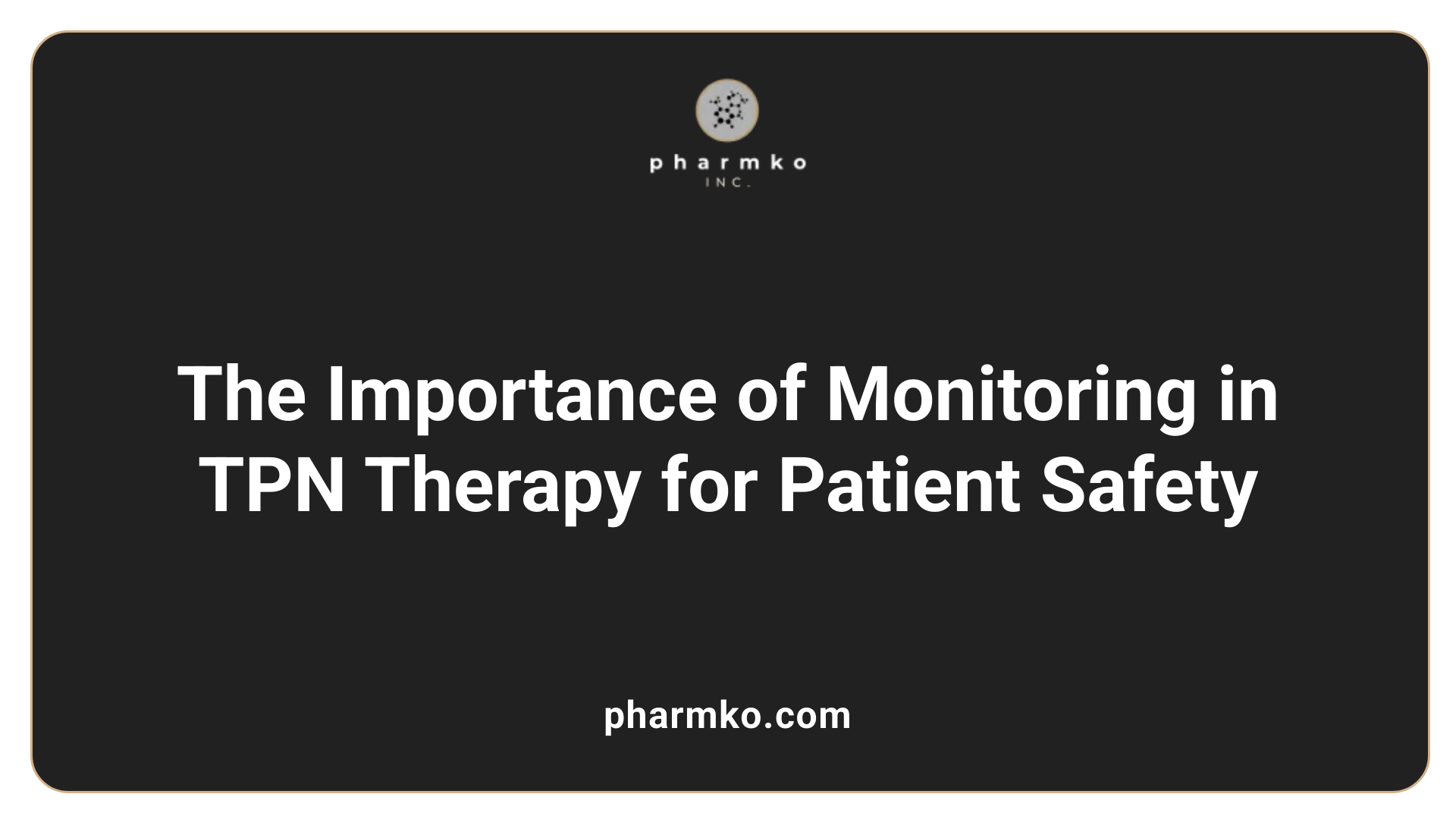
Importance of Regular Assessments
Monitoring patients on Total Parenteral Nutrition (TPN) is crucial as it helps in preventing complications and ensuring that nutritional goals are met. Regular assessments allow healthcare professionals to evaluate biochemical markers and adjust the TPN composition as needed. These assessments identify potential nutrient deficiencies or imbalances early, thus preventing detrimental health impacts.
Obtaining regular blood work, including tests like complete blood counts (CBC), electrolytes, and liver function tests, provides valuable information regarding the patient's nutritional status. For patients at risk of complications such as refeeding syndrome, close monitoring during the initial phase of TPN is particularly essential.
Preventive Monitoring Measures
Preventive measures in TPN monitoring focus on ensuring the patient's stability and safety:
- Routine Laboratory Tests : Monitor electrolyte levels, glucose, and liver enzymes regularly to assess response to TPN.
- Evaluate for Refeeding Syndrome : Early identification and intervention of metabolic imbalances are essential, particularly within the first few days of initiating TPN.
- Nutritional Reevaluation : Periodic reassessment of nutrient needs based on clinical status and laboratory findings ensures optimal nutrient delivery.
By adhering to comprehensive monitoring protocols, clinicians can significantly reduce the risks associated with TPN therapy and enhance patient outcomes.
Conclusion
Total Parenteral Nutrition stands as a life-changing intervention for patients who cannot rely on oral or enteral feeding due to severe medical conditions. While it supports nutritional adequacy, careful monitoring, precise administration, and attention to potential complications are critical to making TPN a safe and effective therapeutic option. As medical practices and nutritional science continue to evolve, TPN will likely integrate with other supportive treatments to enhance patient outcomes, offering hope and healthier prospects for those facing nutritional deficiencies.
References
- Total Parenteral Nutrition - StatPearls - NCBI Bookshelf
- Parenteral Nutrition: What it Is, Uses & Types - Cleveland Clinic
- Parenteral Nutrition Overview - PMC - PubMed Central
- Total parenteral nutrition: A boon to non-functional gastrointestinal ...
- Malnutrition Treatment - Feeding Tube vs. IV Nutrition
- Home parenteral nutrition - Mayo Clinic
- [PDF] The Hitchhiker's Guide to Parenteral Nutrition Management for Adult ...
- Parenteral Nutrition: Reverse Nutrient Deficiencies - Today's Dietitian
- Nutritional Management in the Rehabilitation Setting



